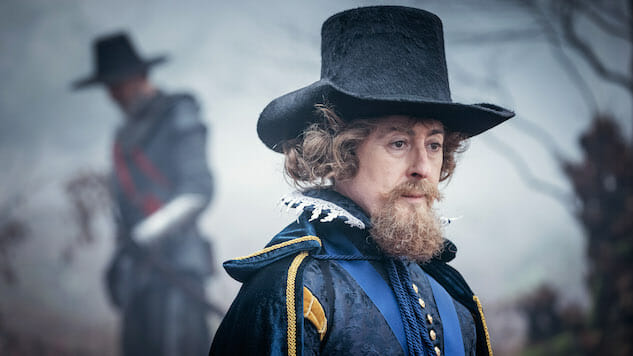What Made Doctor Who‘s “The Witchfinders” the Season’s Best Episode Yet
(Episode 11.08)
Photo: Ben Blackall/BBC America
Matt Brennan and Josh Jackson review Doctor Who each week in a series of letters.
Josh,
I’ve been waiting all season for Doctor Who to fire on all cylinders, to combine the grace of “Miss Rosa” and “Demons of the Punjab” with a worthy adversary for the Doctor (Jodie Whittaker) and her companions, and “The Witchfinders” does it with style to spare. The episode opens in medias res, as the gang wanders into a Sabbath celebration that soon becomes a witch trial—in which the Doctor (of course) interferes, setting in motion an enthralling hour of reanimated corpses and Christians run amok.
With Siobhan Finneran as Becka Savage, a landowning woman driven to madness by her hunt for witches, and the always brilliant Alan Cumming as the preening King James I, “The Witchfinders” features two of the most compelling guest performances of the season—a mark, I think, of writer Joy Wilkinson’s confidence, trusting that her clever premise will carry the day. Plus, for the first time since “The Woman Who Fell to Earth,” Who confronts the Doctor’s gender head-on, finding in witchcraft and its discontents a formidable (if well-rehearsed) allegory for powerful women in patriarchal cultures: As Becka explains of the practice of dunking, the purpose is “to silence foolish women who talk too much.
Sometimes terrifying, sometimes slyly funny, always fully committed to the belief that understanding is the ultimate weapon against evil, “The Witchfinders” is Who as I imagined it before I’d ever seen an episode. For my money, it’s 13’s best showing to date.
What say you?
—Matt

Matt,
My cousin Rachel, who is the biggest Doctor Who fan I know (and also the smartest, with a PhD in English lit), told me years ago that she didn’t think a female Doctor would work, because traveling back through history, no one would allow a woman to take charge. She pointed out that anyone other than a white male would face dismissal in many if not most of the historical destinations, particularly the many British trips the Doctor tends to make.
There are two ways to address this with a female Doctor with non-white companions: The first is to just minimize the sexism and racism in their various encounters. The other is to address it head on in the plotting and characterizations. This episode did the latter beautifully, tackling one of the most notorious instances of violence against women with the killing of women accused of witchcraft in Europe and the U.S. in the 17th century. But while King James might dismiss the Doctor as a gossipy, snooping woman, there is no more passionate and competent advocate for persecuted women than Jodie Whittaker’s Doctor.
The episode was a good window into the dark side of religion, exploring King James’ feelings of abandonment as a child and his desire to find meaning in serving God, but through ignorance and arrogance that search for holiness runs roughshod over the innocent and the outsider.
I don’t expect Doctor Who to always tackle these issues head-on, but I join you in celebrating when the show does it as well as “The Witchfinders.” And when they do it with Alan Cumming as the king, all the better.
—Josh

Josh,
I suppose I shouldn’t expect Who to address the Doctor’s gender week-in, week-out, either—and maybe I wouldn’t want it to. But to me there’s a reason why “The Witchfinders” is particularly compelling, and it’s that it leans into a challenge for the Doctor that feels both organic and full of potential: Here is an entity who renders literal the idea that gender is a social construct, and who is forced nonetheless to deal with the consequences/limitations of that construct. That might sound academic, but it’s actually quite dramatic, and I’d love to see Chibnall and company embrace it even further. And not just in historical contexts, though there are countless possibilities when it comes to the untold stories of the past’s women, whether powerful or put-upon. One thing that could juice up the futuristic episodes that the season has struggled with to this point is to stop acting as if gender (or race) will no longer be a factor if we fast-forward 100 (or 1,000, or 10,000) years. (There’s absolutely no evidence to support that assumption, anyway.) Why not use the tools at one’s disposal, in this case the terrific Jodie Whittaker and an opportunity to put the Doctor in completely novel situations?
One last note, before we press pause on Doctor Who until next week: Telling simpler, more fundamentally convincing stories also seems to free up Who on other levels. So, for instance, the vertiginous angles with which the camera frames Cumming’s King James—suggesting his wily nature—or the climactic close-ups of his eyes as he fails to stand up for the Doctor during her own dunking trial. The landscapes. The costumes. The literary flourishes. (“Evil be to him that evil thinks.”) “The Witchfinders” finds the narrative sweet spot for this iteration of the series, and in doing so allows the aesthetic to play some much-needed catch-up.
In one of our chats about the episode, you wrote, “I have to say I wasn’t sure you’d love Who when you decided to review it,” and I suppose I do, in the way that a friend or family member might: I’m rooting for it, now. I want it to excel. And the seeds of the series’ next great era have already been planted. Now it’s just a question of letting them grow.
—Matt







































